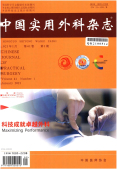中国实用外科杂志2024,Vol.44Issue(8):863-867,5.DOI:10.19538/j.cjps.issn1005-2208.2024.08.05
胃袖状切除术后病人发展为胃食管反流病的自然病程探讨
The natural course of patients developing gastroesophageal reflux disease after sleeve gastrectomy
摘要
Abstract
Gastroesophageal reflux disease(GERD)is highly prevalent in obese patients and is closely related to weight changes.However,according to different types of bariatric and metabolic surgery,it may exacerbate or even induce new-onset GERD depending on the type of bariatric and metabolic surgery performed.Therefore,GERD remains a significant concern for patients undergoing bariatric and metabolic surgery,particularly sleeve gastrectomy(SG).Affected patients not only experience declining physical health but also face psychological and emotional distress,leading to decreased social functioning.The incidence of GERD after SG surgery is caused by the interaction of many factors such as anatomy,physiology,and physics,including the shape of the sleeve stomach,the degree of intraoperative injury to the esophageal sphincter,and whether esophageal hiatal hernia is complicated.Treatment options may include lifestyle modifications,medications,interventional therapies,and/or revisional surgery.关键词
胃袖状切除术/胃食管反流病/肥胖/抗反流屏障/减重代谢手术Key words
sleeve gastrectomy/gastroesophageal reflux disease/obesity/anti-reflux barrier/metabolic and bariatric surgery分类
医药卫生引用本文复制引用
张频,张弘玮..胃袖状切除术后病人发展为胃食管反流病的自然病程探讨[J].中国实用外科杂志,2024,44(8):863-867,5.基金项目
国家自然科学基金面上项目(No.82370901) (No.82370901)

